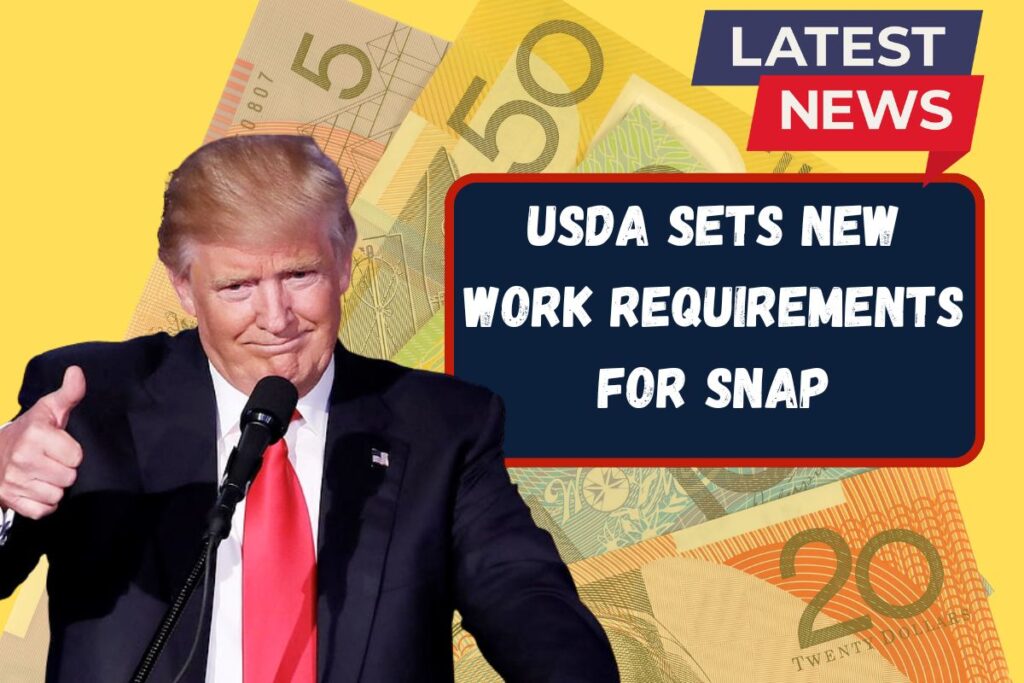Beginning November 1, 2025, the United States Department of Agriculture (USDA) will fully enforce updated work requirements for a specific group of food assistance recipients: Able-Bodied Adults Without Dependents (ABAWDs). These updates mark the end of years of nationwide waivers that paused work rules during the pandemic and recovery period.
With the enforcement now reinstated, hundreds of thousands of SNAP beneficiaries may face changes to their eligibility if they do not meet the new participation standards. The goal of the latest policy, according to officials, is to align SNAP assistance with employment and training pathways that support long-term financial independence.
What is Changing for SNAP in November 2025?
While the policy itself isn’t new, the nationwide enforcement is. For years, states applied work policies inconsistently due to emergency waivers and local exemptions. Under the updated order, the USDA has instructed that all states must apply the full ABAWD requirements starting November 1.
The rules limit SNAP eligibility for certain adults to three months of benefits in a 36-month period unless they meet work or training obligations. Under the new guidelines, fewer than 12% of the caseload may be exempted at the state level.
The change follows direction from the recent One Big Beautiful Bill Act, which emphasized standardized enforcement across the country.
Updated SNAP Work Requirements : Overview
| Title | Details |
|---|---|
| Article On | USDA Work Rules Effective November 2025 |
| Regulating Body | U.S. Department of Agriculture (USDA – FNS) |
| Applicable Persons | ABAWDs receiving SNAP benefits |
| Payment Mode | Monthly EBT Deposit |
| Name of Country | USA |
| Article Category | Finance |
| Website (Official) | https://www.fns.usda.gov/ |

SNAP Eligibility Requirements 2025
The enforcement applies only to ABAWDs, defined as:
- Ages 18–64
- No dependent children in the household
- Not medically exempt from work
USDA estimates 700,000 to 900,000 people may be impacted initially.
Some will automatically remain eligible without meeting work hours if they qualify under state and federal exemptions.
Key Requirements for ABAWDs
To continue receiving SNAP beyond three months within a 36-month window, recipients must meet one or more of the following each month:
| Requirement Type | Details |
|---|---|
| Monthly Work | 80 hours of paid or self-employment |
| Approved Training | Job training or employment program |
| Volunteer Hours | Must equal 80 hours per month |
| Time Limit (if not meeting rules) | 3 months of SNAP in 36 months |
| Effective Nationwide Enforcement | November 1, 2025 |
| Exemptions Allowed | Disabilities, pregnancy, veterans, caregiving, homelessness |
Those who lose eligibility due to work non-compliance may re-qualify immediately if they later meet the 80-hour threshold or receive an exemption.
Why is the USDA Reinstating Work Enforcement?
Officials say the goal is accountability — not budget cuts.
They argue consistent standards encourage participation in workforce systems and are more aligned with the intent of federal law.
Supporters believe enforcement creates opportunities for ABAWDs to engage in training and move toward stable employment.
However, advocacy groups warn that compliance challenges — not willingness to work — could cause some households to lose access to food.
Administrative hurdles such as documentation, part-time job volatility, lack of transportation, and limited broadband access remain major concerns in rural and underserved communities.
How States Are Preparing
State readiness ranges widely based on staffing, data systems, and community infrastructure. Some states already incorporated automation to track work compliance, while others are still training staff and updating systems.
Key readiness indicators reported late October 2025 include:
- California: Waiver requests pending; phased enforcement in rural areas
- Florida: Full enforcement ready for November rollout
- Michigan: Processing delays anticipated due to staffing shortages
- Oregon: Limited rural exemptions allowed; systems updated
- Pennsylvania: Timeline slowed by budget uncertainty
States must also track data closely for USDA monitoring and quarterly reporting.
Impact on SNAP Benefits and Payments
SNAP benefit payments will continue monthly, including during a government shutdown — they are considered mandatory benefits.
However, eligibility status may change for ABAWDs who do not:
- Work enough hours
- Participate in an approved state program
- Verify information on time
Payments do not stop immediately — recipients receive notice before any reduction or pause.
What SNAP Recipients Should Do Now
To avoid losing food assistance, ABAWDs should:
- Submit proof of work hours monthly
- Join an approved employment/training program (E&T)
- Update their state office on health or caregiving changes
- Respond quickly to notices mailed by the state
- Keep contact details current for verification
Those with barriers to employment may qualify for medical or hardship exemptions.
Latest Update On SNAP Work Requirements
The USDA’s nationwide work requirement enforcement for ABAWDs marks a major transition for SNAP heading into 2026. The policy aims to connect food assistance with workforce participation — but could also lead to benefit interruptions for those unable to meet documentation or job-access expectations.
With significant changes ahead, SNAP recipients are encouraged to stay informed, use approved employment programs, and communicate regularly with their local SNAP office to maintain eligibility.
FAQs
1. When do the new work requirements begin?
November 1, 2025 — in all U.S. states and territories.
2. Who must meet the 80-hour rule?
Childless adults ages 18–64 receiving SNAP and not medically exempt.
3. Are there exemptions?
Yes — including pregnancy, disability, homelessness, caregiving responsibilities, and certain training enrollment.
4. Will benefits stop immediately if someone falls short?
No. States must provide notice and a compliance window before pausing benefits.
5. Will SNAP benefits stop during a government shutdown?
No — benefit funding continues, though application and case processing may slow.
